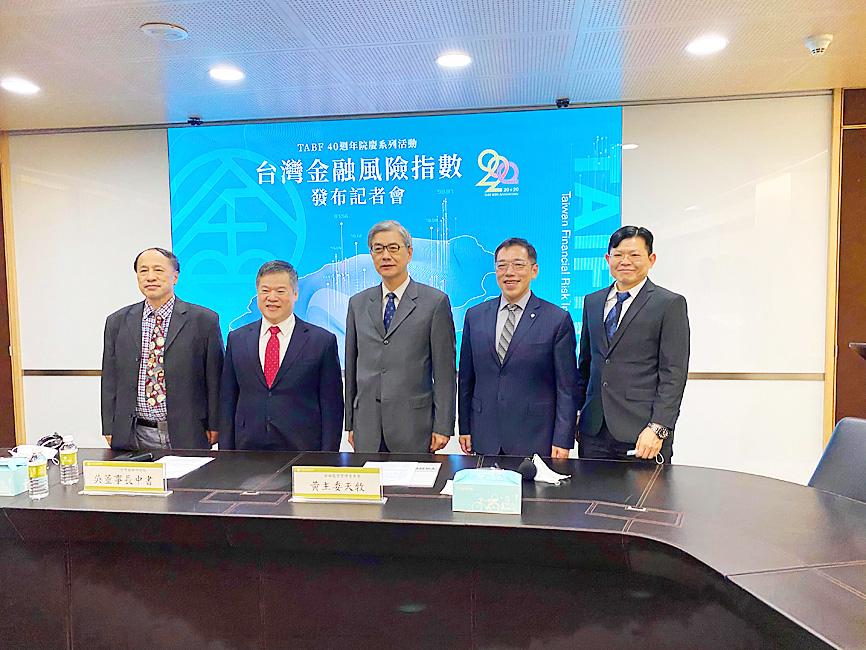The nation’s financial risks remain low, but rising housing prices, lending risks in banks’ overseas branches and stock market volatility need to be monitored, the Taiwan Academy of Banking and Finance (TABF, 台灣金融研訓院) said yesterday at the launch of its Taiwan Financial Risk Index.
The index fell to 98.11 last month, from 98.71 a month earlier and 101.28 in March, indicating that financial risks had been declining since the COVID-19 outbreak, TABF president Hank Huang (黃崇哲) told a news conference in Taipei.
However, it has not returned to pre-pandemic levels, with the index standing at 97.85 in January, Huang said.

Photo: Wu Chia-ying, Taipei Times
The nation’s first self-developed financial risk indicator, the index is composed of four sub-indices: asset valuation risk, systemic stress in the financial sector, potential instability in the non-financial sector, and spillover and contagion risks.
A reading of below 100 indicates low financial risks, while a reading above the threshold suggests higher risks, the nonprofit organization said.
The institute spent two years compiling the index based on the European Central Bank’s financial stability risk index.
It helps regulators enhance supervision and benefits academic research, Financial Supervisory Commission Chairman Thomas Huang (黃天牧) said.
A closer look at the index shows that asset valuation risk, which measures volatility in the stock market, real-estate market and corporate debt, was 101.63 last month, down from 103.4 in October.
However, it remained above 100, reflecting an overheated property market, with rising housing prices and commercial office rents, the institute said.
Systemic stress in the financial sector — calculated based on banks’ loan-to-deposit ratio, capital adequacy, non-performing loan ratio and coverage ratio — fell from 95.4 to 94.2, while stability in the non-financial sector — based on banks’ corporate loans and investment in corporate bonds — also slid from 93.6 to 92.9, it said.
However, spillover and contagion risks climbed to 104.3 from 103.4, ending a three-month decline, as more countries saw a spike in COVID-19 cases, boosting the risks for loans by banks’ overseas branches, TABF said.
Still, it was lower than the peak of 113.2 in March, the data showed.

SEMICONDUCTORS: The German laser and plasma generator company will expand its local services as its specialized offerings support Taiwan’s semiconductor industries Trumpf SE + Co KG, a global leader in supplying laser technology and plasma generators used in chip production, is expanding its investments in Taiwan in an effort to deeply integrate into the global semiconductor supply chain in the pursuit of growth. The company, headquartered in Ditzingen, Germany, has invested significantly in a newly inaugurated regional technical center for plasma generators in Taoyuan, its latest expansion in Taiwan after being engaged in various industries for more than 25 years. The center, the first of its kind Trumpf built outside Germany, aims to serve customers from Taiwan, Japan, Southeast Asia and South Korea,

Gasoline and diesel prices at domestic fuel stations are to fall NT$0.2 per liter this week, down for a second consecutive week, CPC Corp, Taiwan (台灣中油) and Formosa Petrochemical Corp (台塑石化) announced yesterday. Effective today, gasoline prices at CPC and Formosa stations are to drop to NT$26.4, NT$27.9 and NT$29.9 per liter for 92, 95 and 98-octane unleaded gasoline respectively, the companies said in separate statements. The price of premium diesel is to fall to NT$24.8 per liter at CPC stations and NT$24.6 at Formosa pumps, they said. The price adjustments came even as international crude oil prices rose last week, as traders

Taiwan Semiconductor Manufacturing Co (TSMC, 台積電), which supplies advanced chips to Nvidia Corp and Apple Inc, yesterday reported NT$1.046 trillion (US$33.1 billion) in revenue for last quarter, driven by constantly strong demand for artificial intelligence (AI) chips, falling in the upper end of its forecast. Based on TSMC’s financial guidance, revenue would expand about 22 percent sequentially to the range from US$32.2 billion to US$33.4 billion during the final quarter of 2024, it told investors in October last year. Last year in total, revenue jumped 31.61 percent to NT$3.81 trillion, compared with NT$2.89 trillion generated in the year before, according to

PRECEDENTED TIMES: In news that surely does not shock, AI and tech exports drove a banner for exports last year as Taiwan’s economic growth experienced a flood tide Taiwan’s exports delivered a blockbuster finish to last year with last month’s shipments rising at the second-highest pace on record as demand for artificial intelligence (AI) hardware and advanced computing remained strong, the Ministry of Finance said yesterday. Exports surged 43.4 percent from a year earlier to US$62.48 billion last month, extending growth to 26 consecutive months. Imports climbed 14.9 percent to US$43.04 billion, the second-highest monthly level historically, resulting in a trade surplus of US$19.43 billion — more than double that of the year before. Department of Statistics Director-General Beatrice Tsai (蔡美娜) described the performance as “surprisingly outstanding,” forecasting export growth